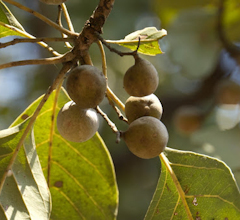Bibhitaki
 Bibhitaki (Terminalia bellirica) is a plant that is native to India. It has a long history of use in traditional medicine in the region. It is one of the essential herbs in Ayurveda and it is one of the constituents of the well-known ayurvedic polyherbal medicine called Triphala (meaning three fruits). Studies show that it is rich in tannins, glucoside, ellagic acid, gallyglucose and ethyl gallate, which may explain its numerous health benefits.1,2
Bibhitaki (Terminalia bellirica) is a plant that is native to India. It has a long history of use in traditional medicine in the region. It is one of the essential herbs in Ayurveda and it is one of the constituents of the well-known ayurvedic polyherbal medicine called Triphala (meaning three fruits). Studies show that it is rich in tannins, glucoside, ellagic acid, gallyglucose and ethyl gallate, which may explain its numerous health benefits.1,2
Although Bibhitaki is frequently used as a traditional remedy in India, its use in the west is relatively new. However, numerous studies show its efficacy on various health conditions.
Health Benefits of Bibhitaki
Below are some of the well-known benefits of Bibhitaki:
- Hepatoprotective
The liver is one of the most metabolically active organs in the body. It is the chemical factory of the body, processing various nutrients and producing many essential nutrients. It also has a central role in detoxification, as it neutralises all toxic foreign matter. It is also responsible for metabolising medications. Regretfully, this also means that it may get damaged due to high exposure to toxins. Studies show that Bibhitaki may help protect liver cells from toxins. Experimental studies show that Bibhitaki can protect the liver from toxic effects of commonly used pain killers like paracetamol and aceclofenac.3,4 - Anti-Diabetes
Type 2 diabetes, the most common form of diabetes, is quite a complex disorder. It is about insulin resistance, altered metabolism of carbohydrates, fats, and proteins. Studies show that Bibhitaki may have potent anti-diabetic action. It appears to help in many ways and it may stimulate insulin production. Bibhitaki also inhibits starch digestion, especially when taken along or after food. Further, Bibhitaki prevents the production of glucose in the liver and prevents the glycation of proteins.5 - Prevents Atherosclerosis
Hypertension is one of the most common health issues, and Bibhitaki has been used as a traditional ayurvedic remedy for this ailment. Modern studies show that Bibhitaki may help prevent atherosclerosis in multiple ways. It has potent antioxidant action and it may reduce the plasma level of various inflammatory biomarkers. It also prevents the oxidation of LDL-cholesterol.6 - Anticancer Activity
Cancer is challenging to prevent and difficult to treat. Bibhitaki may help reduce cancer risk as it exerts anticancer action in many ways. Bibhitaki is an antioxidant and appears that gallic acid found in Bibhitaki may explain its role in preventing or managing cancer.7 - Antimicrobial
Studies show that Bibhitaki may exert strong antimicrobial action. Researchers think that these antimicrobial properties are due to Bibhitaki’s content of alkaloids. It also appears to be active against various antibiotic-resistant strains.8
- Thrombolytic Activity
In one of the experimental studies, researchers found that Bibhitaki could considerably delay clot formation time. Therefore, this may be one of the contributing mechanisms to Bibhitaki’s antiatherosclerosis activity.8 - Anti-Hypertensive
Although studies regarding Bibhitaki are few, experience with Triphala shows that it is quite good for those living with hypertension. Further, experimental studies in mice confirm its dose-dependent blood-pressure-lowering action.8
Side Effects of Bibhitaki
Bibhitaki has a complex mechanism of action. It has numerous phytocompounds. Further, it is worth noting that it is not consumed as food but rather used as a medicinal herb. Although there are no reports of any severe side effects from Bibhitaki, these cannot be excluded. Most of the studies in humans did not mention its side effects. Since Bibhitaki has thrombolytic activity, it is suggested that it’s use may not mix well with blood-thinning drugs. It Is possible that Bibhitaki may also interact with other medications too.8
Properties
- Adaptogen1,2
- Adrenal Support1,2
- Allergies1,2
- Anti-Nausea1,2,7
- Anti-Parasitic8
- Anti-Stress1,2
- Antiseptic8
- Antispasmodic8
- Antiviral8
- Aphrodisiac1,2
- Bladder Support8
- Cardiovascular Support1,5
- Cholesterol5
- Crohn’s Disease1,2
- Cystic Fibrosis1,2
- Demulcent3,4
- Energiser1,2
- Enhances Endurance1,2
- Expectorant1,2
- Fluid Retention1,2
- Gall Bladder Support3,4
- Gall Stones3,4
- Heart Support / Health6,8
- High/Good Levels of Phytochemicals / Phytocompounds1,2
- High/Good Levels of Vitamin C1,2
- Indigestion1,2
- Kidney Support8
- Laxative8
- Oral Health8
- Prostate Support8
- Toothache1,2
- Toxin Removal1,2
- Urethritis Support1,2
- Wound Healing1,2
References:
- Garg AN, Kumar A, Nair AGC, Reddy AVR. Determination of minor and trace elements in Trifala - a herbal preparation. J Radioanal Nucl Chem. 2005;263(3):751-758. doi:10.1007/s10967-005-0653-5
- Sharma P, Verma KK, Raj H, Thakur N. A review on ethnobotany, phytochemistry and pharmacology on Terminalia belerica (Bibhitaki). J Drug Deliv Ther. 2021;11(1-s):173-181. doi:10.22270/jddt.v11i1-s.4739
- Singh DP, Mani D. Protective effect of Triphala Rasayana against paracetamol-induced hepato–renal toxicity in mice. J Ayurveda Integr Med. 2015;6(3):181-186. doi:10.4103/0975-9476.146553
- Gupta A, Pandey AK. Aceclofenac-induced hepatotoxicity: An ameliorative effect of Terminalia bellirica fruit and ellagic acid. World J Hepatol. 2020;12(11):949-964. doi:10.4254/wjh.v12.i11.949
- Kasabri V, Flatt PR, Abdel-Wahab YHA. Terminalia bellirica stimulates the secretion and action of insulin and inhibits starch digestion and protein glycation in vitro. Br J Nutr. 2010;103(2):212-217. doi:10.1017/S0007114509991577
- Tanaka M, Kishimoto Y, Saita E, et al. Terminalia bellirica Extract Inhibits Low-Density Lipoprotein Oxidation and Macrophage Inflammatory Response in Vitro. Antioxidants. 2016;5(2):20. doi:10.3390/antiox5020020
- Patra S, Panda PK, Naik PP, et al. Terminalia bellirica extract induces anticancer activity through modulation of apoptosis and autophagy in oral squamous cell carcinoma. Food Chem Toxicol. 2020;136:111073. doi:10.1016/j.fct.2019.111073
- Gupta A, Kumar R, Kumar S, Pandey AK. Pharmacological Aspects of Terminalia belerica. In: ; 2017:52-64.
